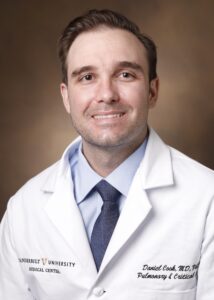Meet the new Stahlman-Thomas PSTP Associate College Advisor: Dan Cook, M.D., Ph.D.
By Landon Clark (M2)
 Dr. Dan Cook, M.D., Ph.D. is a 2018 graduate of the University of Iowa Roy J. and Lucille A. Carver College of Medicine. He is from Kansas City, and he attended the University of Missouri-Columbia, where he majored in Biological Sciences and Chemistry. Afterwards, he attended the Medical Scientist Training Program at Carver College of Medicine at University of Iowa. There, he obtained his PhD in Molecular Physiology and Biophysics. He subsequently completed his Internal Medicine-PSTP Residency at Vanderbilt University Medical Center, where he began training in Pulmonary and Critical Care Medicine. His long-term goal is to provide meaningful, improved clinical treatment options for patients with cystic fibrosis. His current work is funded by the Cystic Fibrosis Foundation through a LeRoy Matthews Physician Scientist Career Development Award.
Dr. Dan Cook, M.D., Ph.D. is a 2018 graduate of the University of Iowa Roy J. and Lucille A. Carver College of Medicine. He is from Kansas City, and he attended the University of Missouri-Columbia, where he majored in Biological Sciences and Chemistry. Afterwards, he attended the Medical Scientist Training Program at Carver College of Medicine at University of Iowa. There, he obtained his PhD in Molecular Physiology and Biophysics. He subsequently completed his Internal Medicine-PSTP Residency at Vanderbilt University Medical Center, where he began training in Pulmonary and Critical Care Medicine. His long-term goal is to provide meaningful, improved clinical treatment options for patients with cystic fibrosis. His current work is funded by the Cystic Fibrosis Foundation through a LeRoy Matthews Physician Scientist Career Development Award.
What led you to be a physician scientist?
Dr. Cook was interested in science from an early age, and when he attended the University of Missouri-Columbia, he met his undergraduate research mentor, Dawn Cornelison, PhD. As an undergraduate, he studied the role of satellite cells, stem cells responsible for growth and regeneration of skeletal muscle, in muscular dystrophy. During this time, he was given autonomy to define his own project, found immense enjoyment in scientific curiosity and discovery, and decided to pursue further training as part of the University of Iowa’s MSTP program.
How did you pick your medical specialty, and any advice for those on this path?
Dr. Cook originally thought ophthalmology was going to be his area of expertise when first arriving at University of Iowa. However, in his second year at the University of Iowa, he met his eventual PhD mentor, David Stoltz, MD, PhD. In the Stoltz lab, Dr. Cook became interested in the pathogenesis of a common genetic lung disease known as cystic fibrosis. It was through this research experience that Dr. Cook became interested in pulmonology and critical care. He says that Pulmonary and Critical Care Medicine is an underappreciated track for physician scientists, as it gives flexibility in clinical and research time. This flexibility is essential for protected research and clinical time.
What do you do for fun, and how do you maintain a work-life balance?
Dr. Cook enjoys spending time with his family. He has two kids, a 4 year old and a 2 year old, who keep him busy traveling to ballet recitals and going to festivals. He enjoys hiking at Shelby Bottoms Nature Center, going to concerts, and hanging out with colleagues. One of his favorite pastimes is distilling his own bourbon, a hobby that, like his science, takes a tremendous amount of patience and precision.
Any advice for those on the current pathway to be a physician-scientist?
“Always having an end goal. Don’t lose focus on maintaining clinical skills during research years, and vice versa. The challenge will be to bridge both aspects of this field. Finding the right program if you do live in both domains is essential.”
What is the most important lesson you learned throughout your training?
“Failure is going to happen, and it is a part of the process. Gaining comfort with taking scientific risks, even in the setting of failure, is important during MSTP training. Surrounding yourself with mentors and peers who make you a better scientist, clinician, and lifelong learner will make even the most difficult failures worthwhile.”